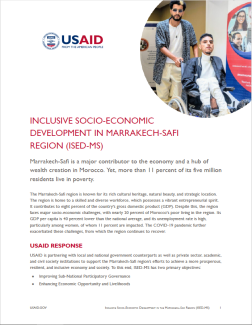Marrakech-Safi is a major contributor to the economy and a hub of wealth creation in Morocco. Yet, more than 11 percent of its five million residents live in poverty.
The Marrakech-Safi region is known for its rich cultural heritage, natural beauty, and strategic location. The region is home to a skilled and diverse workforce, which possesses a vibrant entrepreneurial spirit. It contributes to eight percent of the country's gross domestic product (GDP). Despite this, the region faces major socio-economic challenges, with nearly 20 percent of Morocco's poor living in the region. Its GDP per capita is 40 percent lower than the national average, and its unemployment rate is high, particularly among women, of whom 11 percent are impacted. The COVID-19 pandemic further exacerbated these challenges, from which the region continues to recover.
USAID RESPONSE
USAID is partnering with local and national government counterparts as well as private sector, academic, and civil society institutions to support the Marrakech-Safi region’s efforts to achieve a more prosperous, resilient, and inclusive economy and society. To this end, ISED-MS has two primary objectives:
- Improving Sub-National Participatory Governance
- Enhancing Economic Opportunity and Livelihoods
USAID promotes the integration of these two objectives. ISED-MS aims to foster effective and sustained interaction between efforts that advance participatory governance, improved livelihoods, and business opportunities, with the end goal of achieving inclusive, accelerated, and long-term regional growth.
ISED-MS supports the people of the region by:
- Improving local governments’ performance, transparency, and accountability.
- Empowering citizens, especially youth, women, and persons with disabilities, to get involved in the development process and express their ideas and opinions.
- Strengthening partnerships between academic institutions and the private sector to enhance workforce skills and create job opportunities.
- Mapping out high-potential value chains and supporting local public and private institutions to drive investment opportunities, create jobs, and add value for all.
To accelerate progress, ISED-MS adopts a systemic approach for converging public policies. The program facilitates multi-sectoral communication that enables government institutions, elected bodies, civil society, academia, and businesses to collaboratively develop programs, budgets, and policies toward the achievement of an overarching vision for the region.
RESULTS ACHEIVED TO DATE
ISED-MS has made substantial progress since its inception, with key foundational results achieved reflecting the program’s efforts to build tools, methodologies, and partnerships that benefit local partners and other regions in Morocco. Results so far include:
- Reinforced a strong partnership with the Regional Council, Wilaya, and other regional stakeholders by co-creating the Year 1 work plan.
- Launched the partner commune and civil society organization selection process with the aim to bolster their performance, capacity, and overall effectiveness.
- Initiated an inclusive entrepreneurship program to introduce beneficiaries to social innovation and business creation, with a focus on youth, women, and people with disabilities.
Reinforced central-level engagement by partnering with national-level institutions such as Direction Générale des Collectivités Territoriales (DGCT) to ensure synergies and replication.
FACTS AND FIGURES
IMPLEMENTING PARTNERS
- Deloitte Conseil
- Mohamed VI Polytechnic University (UM6P)
- Enactus Morocco
BUDGET
$18 million
DURATION
July 2022 - June 2027
KEY CONTACT
Alae Eddin Serrar, Project Management Speciality, aserrar@usaid.gov


